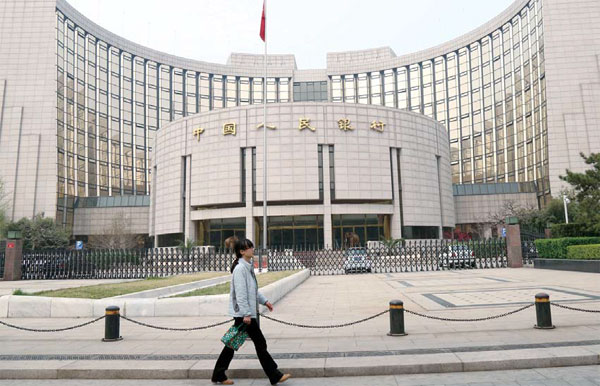Financial reforms get thumbs-up
Updated: 2016-01-08 07:57
By Cecily Liu(China Daily Europe)
|
|||||||||||
China's plans to liberalize rules governing the country's finances between now and 2020 win approval from analysts
Experts in financial policy have endorsed China's policy of further financial liberalization in its 13th Five-Year Plan (2016-20).
Analysts say they feel confident that most capital controls can be further relaxed over the coming decade. They also say it will aid further integration of the country into the global economy.
|
The People's Bank of China building in Beijing. Wang Yueling / For China Daily |
The new five-year plan, seen as the blueprint for China's development for the next half-decade, will be published in March. A proposed plan was adopted at a key Party meeting in Beijing on Oct 29.
The plan is expected to lay out reforms that further facilitate foreign investment in China's financial sector and freer cross-border use of the renminbi. It also is expected to strive to improve financial laws and regulations to help market forces play a bigger role in the financial system, and at the same time reducing risks.
The plan will also lay out the government's intention to reduce restrictions on overseas investment by Chinese firms and reach a more neutral balance in the balance of payments.
Minny Siu, a partner at the law firm King & Wood Mallesons, says the policy changes are likely to have a profound effect on the type, volume and location of financial flows and financial market activity over the next decade and beyond.
She says 2015 was a "momentous year" for China's financial reform, and the pace of reform is positive for further liberalization. She expects to see more trading links connecting the Chinese mainland and international markets covering different asset classes and channels in the five-year plan.
She also expects financial liberalization to lead to fast growth of more peer-to-peer lenders in China, offering market rates for investors and competitive interest rates for borrowers, and the emergence of more peer-to-peer equity investment platforms.
Hui Tai, chief market strategist in Asia for JP Morgan Asset Management, says China has already made tremendous efforts to open up and liberalize its capital account in recent years, including policies such as the qualified foreign institutional investor and qualified domestic institutional investor programs, and renminbi internationalization.
The QFII and QDII programs are policies that allow approved overseas and Chinese firms to invest in each other's markets, as China historically did not allow the free flow of cross-border capital or free exchange of currencies.
Financial liberalization began when China joined the World Trade Organization in 2001, and China's currency internationalization reached a milestone when the International Monetary Fund announced in November its inclusion in the basket of special drawing rights currencies.
Despite tremendous progress, many technical questions over reform measures remain to be answered for further liberalization, such as how to reduce the exchange rate differential between onshore renminbi, or CNY, and offshore renminbi, or CNH, Hui says.
Further reform measures outlined in five-year plan proposals, such as interest rate and exchange rate liberalization, are important, too, because economic reform and financial reform go hand in hand, Hui says.
Meanwhile, the proposed financial reforms also have certain challenges that could make things difficult, says Siu, explaining that because a number of recent measures have been done on a pilot basis, no corresponding laws apply to them. That means sometimes it is difficult for international investors to have confidence and a good understanding of the new policies.
"Such confidence extends to the rule of law, clear and transparent process, and dispute-settlement procedure and the financial regulatory structure in China," Siu says.
Kerry Brown, professor of Chinese studies and director of the Lau China Institute at King's College in London, says market participants would find it helpful if the five-year plan could give indications on the speed of financial reforms, so they can make decisions accordingly.
"For example, as China opens up its capital accounts and liberalizes the renminbi, it would be helpful to know how quickly China plans to make the renminbi an international currency," he says.
"There would be a big difference for the Chinese and global economy if China hopes to implement these reforms in a progressive manner, and if China wants to implement them very fast. The economy may be affected adversely if sudden, unexpected reform measures are introduced."
Hui says financial reforms will help China to further integrate its economy globally, which would help China's domestic financial markets achieve more stability.
For example, turmoil like the kind experienced by China's stock market in the summer could be made less severe if more long-term-thinking institutional investors were encouraged to join the market, which is currently dominated by retail investors with a herd instinct, he says.
"To encourage more institutional investors to enter the stock market, the government should reform some of the rules," Hui adds.
cecily.liu@mail.chinadailyuk.com
( China Daily European Weekly 01/08/2016 page30)
Today's Top News
Going mobile
Wealth of options for China's super-rich
Man with knife shot dead outside Paris police station
Trading halted after shares fall 7% in opening minutes
China voices its 'resolute opposition' to DPRK test
Design exhibition to attract Chinese art works
Germans shaken by mass attacks on women
Concerns grow over Saudi-Iranian rising tensions
Hot Topics
Lunar probe , China growth forecasts, Emission rules get tougher, China seen through 'colored lens', International board,
Editor's Picks

|

|

|

|

|

|







